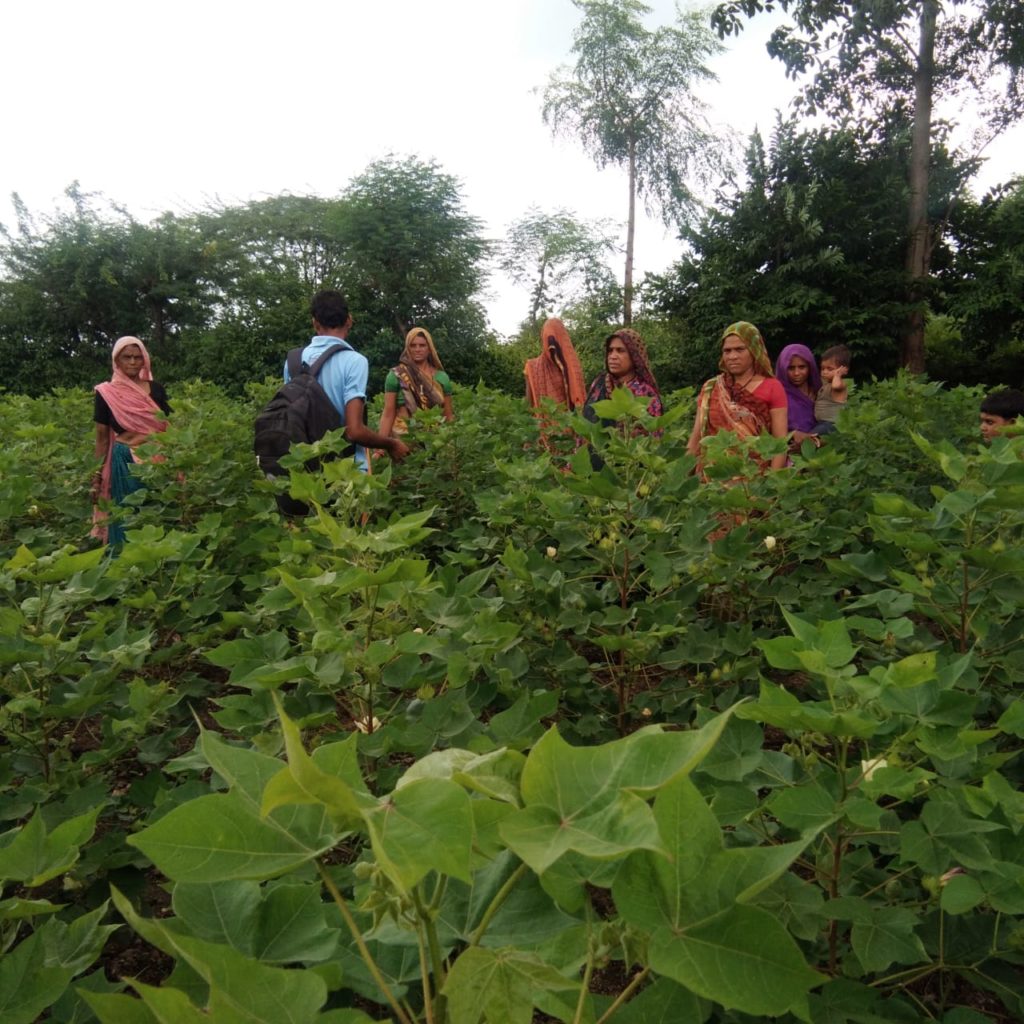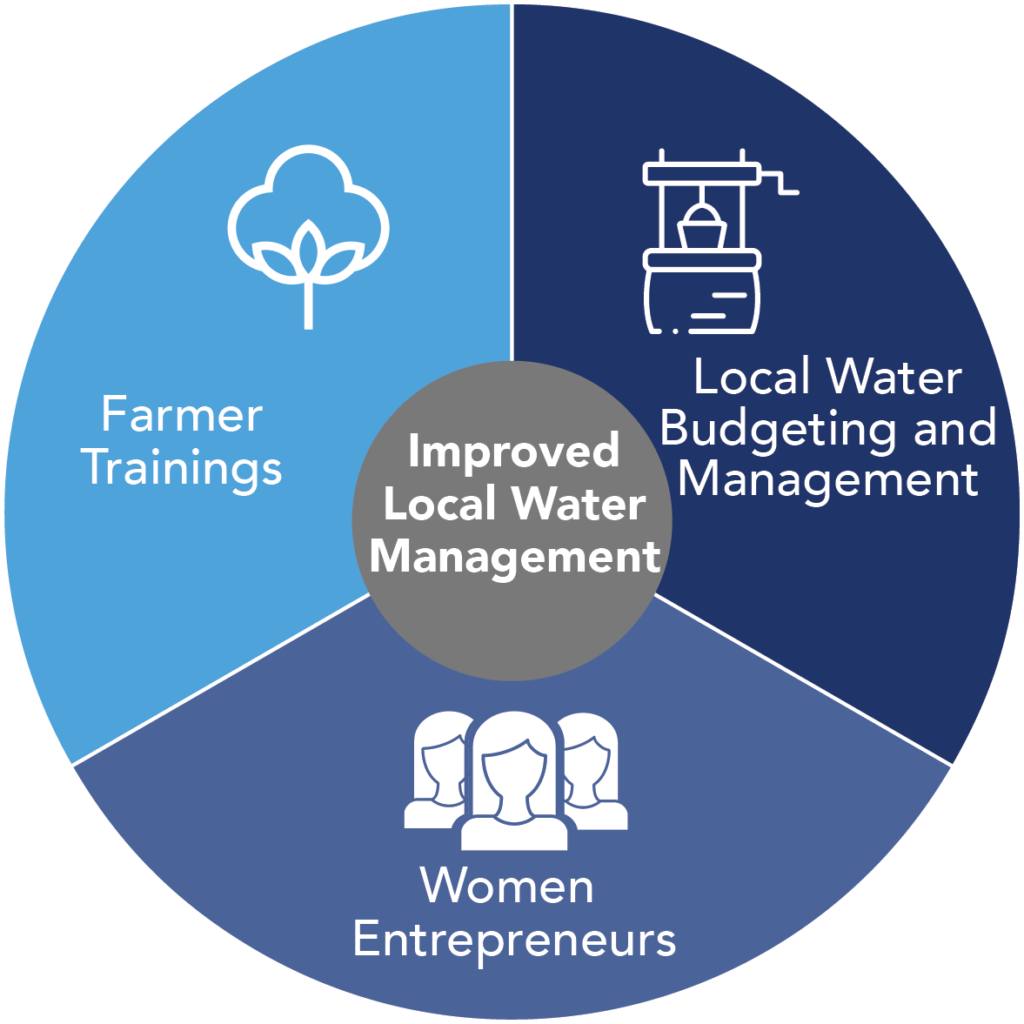Tulsabai, a farmer in Sawner village of Ralegaon block in Yavatmal district of Maharashtra looks up to the sky to see if there is possibility of rains. Rainfall in the Vidarbha region of Maharashtra, a major cotton growing belt in India and a region facing high water scarcity, has been more than the average this year. As Tulsabai prepares to leave for her cotton field to apply a bio-pesticide, she wants to ensure the weather will remain dry.
Tulsabai is one of the farmers who have provided an acre of their farming land to implement package of farming practices that address prevalent water availability issues by reducing water use and pollution in cotton cultivation. Several female farmers like Tulsabai are part of this Institute for Sustainable Communities (ISC) pilot project under the USAID-Gap Inc.-led Women + Water Alliance, which is being implemented across 30 villages in three cotton growing blocks in the states of Madhya Pradesh and Maharashtra.
Empowering women is essential if India hopes to tackle its water crisis. Women account for a substantial proportion of the agricultural labor force and perform the bulk of unpaid care and domestic work within families and households in rural areas. According to Government of India estimates, women form 75 percent of the agricultural sector workforce. In rural India, around 80 percent of women depend on agriculture for their livelihood.
Women also make significant contributions to agricultural production, food security and nutrition, land and natural resources management, and building climate resilience. In addition, the responsibility of collecting and managing water use in the household rests on women, who at times have to walk large distances to fetch water, which takes a lot of their time. It is estimated that women in rural areas, at times spend 3-4 hours in a day in collecting water.

Further, with strong involvement in both the planting and harvesting of cotton crops, women determine the quantity, quality, and sustainability of cotton farming. Yet, too often they are absent from decision-making.
Training Women on a New Approach to Cotton Cultivation
Working with farmers, communities and village level institutions, ISC through the W+W Alliance, is testing and developing a model for better soil and water management in cotton cultivation and improving understanding of local water balance through water budgeting and developing village water management plans. In addition, a cadre of female farmers extension workers are being trained on sustainable cotton cultivation practices that reduce the use of harmful synthetic chemicals.
Sunita, a Krishi Sakhi (farmer friend – village level extension worker trained under the project) working in Girwania village of Kukshi block in Dhar district of Madhya Pradesh believes that access to extension services and right inputs will lower the vulnerability of the farmers and help enhance their productivity and incomes. She is spearheading the extension efforts in her village by engaging with farmers to create awareness on improved agronomic practices and water management that combine water demand management – through on-farm water conservation measures and a plan for enhancing the water supply through development of village water plans.

Engaging Rural Women in New Economic Opportunity
ISC is working to leverage existing women groups in the villages, building their capacities on production of organic fertilizers and pesticide, strengthening their economic status, reducing the use of chemicals, and promoting the use of agricultural inputs to improve the health and well-being of farmers and the environment. Moreover, through the W+W Alliance these women groups are being linked with the potential schemes of the State Rural Livelihood Missions for promoting alternate livelihood through entrepreneurship development. Enhanced use of organic fertilizers and pesticides will not only lead to economic empowerment of women but will also improve their health through reduced exposure to synthetic chemicals in cotton cultivation.
Today, as we celebrate another International Day of Rural Women, we salute the spirit of women cotton farmers who often spend 6 hours in a day working in cotton fields and another 6-7 hours taking care of the household activities. Our efforts working with female cotton farmers in India, is directed towards building their capacities to become decision-makers for the betterment of themselves, their households, and their communities. Addressing water scarcity issues, ensuring sustainability of water through demand management, supply enhancement and fostering behavior change towards usage and management of water will go a long way in improving the lives of the women.
This post does not represent the views or positions of the U.S. Agency for International Development, the U.S. Government, or Gap Inc.
